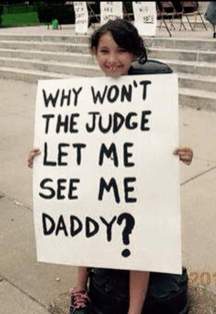With Steven Sumner Discussing
Bullied to Death:
Chris Mackney's Kafkaesque Divorce
 Conservatives aren't just fighting same-sex marriage; They’re also trying to stop divorce?!
Conservatives aren't just fighting same-sex marriage; They’re also trying to stop divorce?!
For years, social conservatives have been fighting to prevent certain people from getting married. But they’re waging a parallel battle, too: Trying to keep married couples together.
In cooperation with the Family Research Council and the National Organization for Marriage, socially conservative politicians have been quietly trying to make it harder for couples to get divorced. In recent years, lawmakers in more than a dozen states have introduced bills imposing longer waiting periods before a divorce is granted, mandating counseling courses or limiting the reasons a couple can formally split.
If divorces are tougher to obtain, social conservatives argue, fewer marriages will end. And having more married couples is not just desirable in its own right but is a social good, they say. During his presidential campaign, former senator Rick Santorum (R-Pa.) emphasized finishing high school and getting married as cures for poverty. “If you do those two things, you will be successful economically,” he declared at a 2011 event in Iowa.
A legislative movement against divorce may seem like a non-starter in a country where half of married couples avail themselves of this right, but as with legal challenges to Obamacare and the rise of the tea party movement, today’s fringe idea can quickly become tomorrow’s mainstream conservatism.
Divorce has long been a cultural touchstone in America. Social conservatives regularly advocate a return to a more traditional system of divorce — namely that it be extraordinarily difficult to get. For example, the only way an Alabamian could get a divorce under the state’s original 1819 constitution: “No decree for such divorce shall have effect until the same shall be sanctioned by two thirds of both Houses of the General Assembly.” Even a battered wife — who, of course, couldn’t vote — would have to petition her all-male state legislature and get supermajority approval before being freed from matrimony.
For most of American history, to obtain a divorce, one party had to prove to a judge that the other party was at fault, meaning he or she had committed certain grievous acts that irreparably harmed the marriage, such as adultery or being convicted of a felony. Emotional or physical abuse wasn’t always enough; even adultery or abandonment could be insufficient if a spouse reluctant to get divorced convinced a judge that his or her partner was similarly culpable. And as historian Glenda Riley showed in her 1991 book “Divorce: An American Tradition,” loveless couples often found creative ways to persuade judges to end their marriages: As recently as the 1950s, some couples would stage a bust, complete with hotel room, “mistress,” photographer and private detective who would testify in court about the husband’s (or wife’s) supposed illicit deeds.
In cooperation with the Family Research Council and the National Organization for Marriage, socially conservative politicians have been quietly trying to make it harder for couples to get divorced. In recent years, lawmakers in more than a dozen states have introduced bills imposing longer waiting periods before a divorce is granted, mandating counseling courses or limiting the reasons a couple can formally split.
States such as Arizona, Louisiana and Utah have already passed such laws, while others such as Oklahoma and Alabama are moving to do so.
If divorces are tougher to obtain, social conservatives argue, fewer marriages will end. And having more married couples is not just desirable in its own right but is a social good, they say. During his presidential campaign, former senator Rick Santorum (R-Pa.) emphasized finishing high school and getting married as cures for poverty. “If you do those two things, you will be successful economically,” he declared at a 2011 event in Iowa.
A legislative movement against divorce may seem like a non-starter in a country where half of married couples avail themselves of this right, but as with legal challenges to Obamacare and the rise of the tea party movement, today’s fringe idea can quickly become tomorrow’s mainstream conservatism.
Divorce has long been a cultural touchstone in America. Social conservatives regularly advocate a return to a more traditional system of divorce — namely that it be extraordinarily difficult to get. For example, the only way an Alabamian could get a divorce under the state’s original 1819 constitution: “No decree for such divorce shall have effect until the same shall be sanctioned by two thirds of both Houses of the General Assembly.” Even a battered wife — who, of course, couldn’t vote — would have to petition her all-male state legislature and get supermajority approval before being freed from matrimony.
For most of American history, to obtain a divorce, one party had to prove to a judge that the other party was at fault, meaning he or she had committed certain grievous acts that irreparably harmed the marriage, such as adultery or being convicted of a felony. Emotional or physical abuse wasn’t always enough; even adultery or abandonment could be insufficient if a spouse reluctant to get divorced convinced a judge that his or her partner was similarly culpable. And as historian Glenda Riley showed in her 1991 book “Divorce: An American Tradition,” loveless couples often found creative ways to persuade judges to end their marriages: As recently as the 1950s, some couples would stage a bust, complete with hotel room, “mistress,” photographer and private detective who would testify in court about the husband’s (or wife’s) supposed illicit deeds.
This system began to crumble during the 1960s. In 1969, California became the first state to legalize no-fault divorces — permitting divorce without requiring proof of wrongdoing such as adultery — in the Family Law Act, signed by Gov. Ronald Reagan. Within a decade, 45 other states had joined California. By 1985, 49 states had legalized no-fault divorce; New York did just four years ago.
No-fault divorce has been a success. A 2003 Stanford University study detailed the benefits in states that had legalized such divorces: Domestic violence dropped by a third in just 10 years, the number of husbands convicted of murdering their wives fell by 10 percent, and the number of women committing suicide declined between 11 and 19 percent. A recent report from Maria Shriver and the Center for American Progress found that only 28 percent of divorced women said they wished they’d stayed married.
No-fault divorce has been a success. A 2003 Stanford University study detailed the benefits in states that had legalized such divorces: Domestic violence dropped by a third in just 10 years, the number of husbands convicted of murdering their wives fell by 10 percent, and the number of women committing suicide declined between 11 and 19 percent. A recent report from Maria Shriver and the Center for American Progress found that only 28 percent of divorced women said they wished they’d stayed married.





































